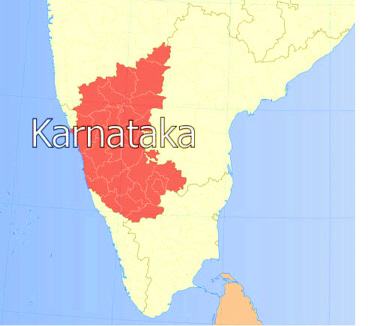ಕನ್ನಡ

(Bildquelle: PlaneMad/Wikipedia. -- CC-by-sa)
An Elementary Grammar of the Kannada, or
Canarese Language
by Thomas Hodson
30. Syntax of Negation (§§ 253
-260)
Zitierweise / cite as:
Hodson, Thomas: An elementary grammar of the
Kannada, or Canarese language. -- 30. Syntax
of Negation (§§ 253 -260). -- Fassung vom 2011-08-26. -- URL:
http://www.payer.de/hodson/hodson30.htm
First published as: Hodson,
Thomas: An elementary grammar of the Kannada, or Canarese language ; in
which every word used in the examples is translated, and the pronunciation is
given in English characters. -- 2. ed. -- Bangalore : Wesleyan Mission Press,
1864. -- 128 p. ; 23 cm.
First time published here:
2011-08-26
Revisions:
©opyright: Public domain
This text is part of the section
Sanskrit und Indien of
Tüpfli's Global Village Library
If you don't get the
diacritics displayed, install a Unicode font like Tahoma.
Syntax [ಪ್ರಯೋಗ prayōga]
of Negation
0. Contents
- 1. Negative Mood [ನಿಷೇದ niṣēdha]
- 2. Negation
- 2.1. ಇಲ್ಲ illa
- 2.2. ಅಲ್ಲ alla
1. Negative Mood [ನಿಷೇದ niṣēdha]
253. The Negative mood has only one simple
tense, which is either past, present, or future, according to the context; as,
- ಈಗ ಕೊಡರು īga koḍaru, They do not (or will not,)
now give.
- ನಿನ್ನೆ ಹೇಳನು ninne hēḷanu, He did not say yesterday.
- ನಾಳೆ ಶಿಕ್ಕದು nāḷe śikkadu, It will not to be had
tomorrow.
2. Negation
254. Negation is generally expressed by
ಇಲ್ಲ illa, or ಅಲ್ಲ alla.
2.1. ಇಲ್ಲ illa
255. ಇಲ್ಲ illa, denies existence, and is used
with any time, gender, number or person. It may be added to a noun, verbal noun,
or infinitive of a verb, and is the negative answer to a question of existence.
256. Added to nouns,
ಇಲ್ಲ illa, denotes the
non-existence of a thing or person, or non-existence in a particular place; as,
- ಒಂದು ಇಲ್ಲ oṃdū illa, There is not even one.
- ಕುದುರೆಯ ಕೊಂಬು ಇಲ್ಲ kudureya koṃbu illa, There is no such
thing as a horse's horn.
- ಅವನು ಮನೆಯಲ್ಲಿ ಇಲ್ಲ avanu maneyalli illa, He is not at
home.
- ಆ ತೋಟದಲ್ಲಿ ಬಾಳೇ ಮರಗಳು ಇಲ್ಲ
ā tōṭadalli bāḷē maragaḷu illa, There
are no platain trees in that garden.
257. ಇಲ್ಲ illa, with dative or locative
case denies possession; as,
- ಅವನಿಗೆ ಹಣವಿಲ್ಲ avanige haṇavilla, He has no money.
- ನಿಮ್ಮಲ್ಲಿ
ಜ್ಞಾನ ಇಲ್ಲವೋ
nimmalli jñāna illavō, Have you no
wisdom?
- ಅವರಿಗೆ ಬುದ್ಧಿ ಇಲ್ಲ ವಿವೇಕವೂ
ಇಲ್ಲ avarige buddhi illa vivēkavū illa,
They have neither sense nor discrimination.
258
ಇಲ್ಲ illa, is added to verbal nouns; as,
- ಇಂಥಾ ಕೆಲಸ ಕಂಡದ್ದೂ ಇಲ್ಲ
ಕೆಳಿದ್ದೂ ಇಲ್ಲ iṃthā kelasa kaṃḍaddū illla keḷiddū
illa, Such a thing as was never seen or heard of.
- ನಾನು ಹೋಗುವದಿಲ್ಲ nānu hōguvadilla, I will not go.
- ನೀನು ಬರುವದಿಲ್ಲ nīnu baruvadilla, Thou wilt not come.
- ಅವನು (ಅವಳು,
ಅದು, ನಾವು, ನೀವು, ಅವರು, ಅವು) ಕೊಡುವದಿಲ್ಲ
avanu (avaḷu, adu, nāvu, nīvu, avaru,
avu) koḍuvadilla, He (she, it, we, ye, they, they neut.) will not give.
259. Examples of
ಇಲ್ಲ illla, as the negative
answer to a question.
- ನೀನು ಹಾಗೆ ಹೇಳಿದಿಯೋ nīnu hāge hēḷidiyō, Did you say so?
ಇಲ್ಲ illa, No.
- ಕರೆಯಲ್ಲಿ ನೀರು ಉಂತೋ kereyalli nīru uṃṭō, Is there any
water in the tank?, ಇಲ್ಲ illa, No.
- ಹುಡುಗರು ಮಠಕ್ಕೆ ಹೋಗಿದ್ಧಾರೋ
huḍugaru maṭhakke hōgiddhārō, Havee
the boys gone to school? ಇಲ್ಲ illa, No.
2.2. ಅಲ್ಲ alla
260. Negation of quality or nature is
expressed by ಅಲ್ಲ alla, no; as,
- ಇದು ಕಾಗದವೋ idu kāgadavō, Is this paper?
ಅಲ್ಲ alla, No
(it is something else).
- ಇವನು ನಿನ್ನ ಮಗನೋ ivanu ninna maganō, Is this your son?
ಅಲ್ಲ alla, No (he is not).
- ಅದು ಪಟ್ಣವಲ್ಲ ಚಿಕ್ಕ ಊರು
adu paṭṇavalla cikka ūru, It is not a
city, but a small town.
ಇಲ್ಲ illa, and
ಅಲ್ಲ alla, are not interchangeable,
and great care must be observed for their correct use.
To 31. Syntax of the Affirmative Mood (§§
261 - 264)

